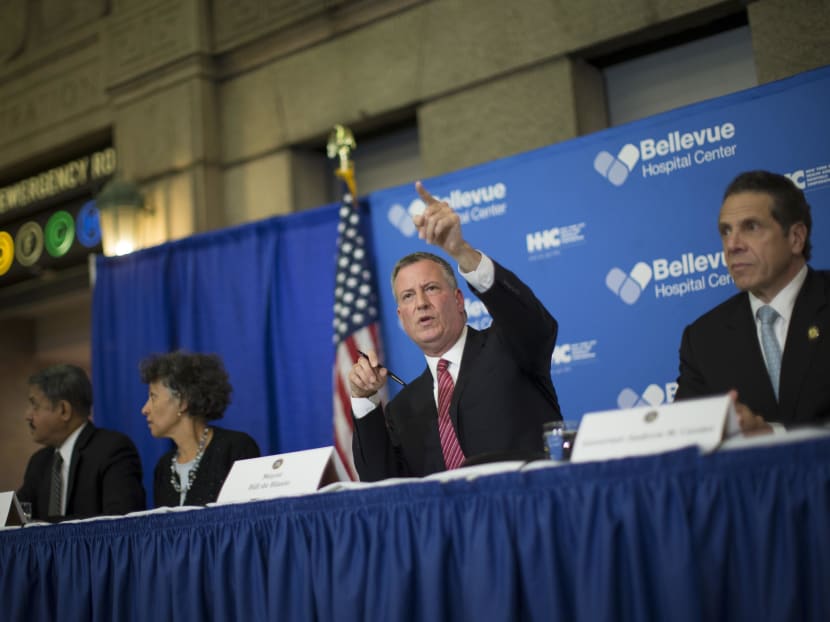Officials urge calm after 1st NYC Ebola case
NEW YORK — Officials urged residents of America’s most populous city to remain calm after a New York City doctor, who had recently travelled to Guinea, tested positive for Ebola.

New York City Mayor Bill de Blasio (second from right) speaks during a news conference at Bellevue Hospital to discuss Craig Spencer, a Doctors Without Borders physician who recently returned to the city after treating Ebola patients in West Africa, Oct 23, 2014, in New York. Photo: AP
NEW YORK — Officials urged residents of America’s most populous city to remain calm after a New York City doctor, who had recently travelled to Guinea, tested positive for Ebola.
Mayor Bill de Blasio and Gov Andrew Cuomo urged residents not to be alarmed by the doctor’s diagnosis yesterday (Oct 24), even as they described him riding the subway, taking a cab and bowling since returning to New York a week ago. Mayor De Blasio said all city officials followed “clear and strong” protocols in their handling and treatment of him.
“We want to state at the outset that New Yorkers have no reason to be alarmed,” Mayor de Blasio said. “New Yorkers who have not been exposed are not at all at risk.”
The doctor, Dr Craig Spencer, a member of Doctors Without Borders, reported yesterday morning coming down with a 38°C fever and diarrhoea. He was being treated in an isolation ward at Manhattan’s Bellevue Hospital, a designated Ebola centre.
In appearance on CNN this morning, the governor said Dr Spencer “presented himself” to the hospital when he had a “100-point-3 fever... not 103 (39.5°C)... as has been reported”.
New York City’s health department today confirmed that the doctor’s temperature was 100.3 (38°C).
Gov Cuomo said today that the doctor “obviously felt he wasn’t symptomatic” when he went out “in a limited way”.
“When you’re a doctor you know you’re not contagious until you’re symptomatic,” Gov Cuomo said on NBC’s Today show. “As soon as he had a fever he presented himself to a hospital.”
The governor, in an appearance on CNN’s New Day, said there was no reason to fear riding the subway, and he would do so today.
The Centres for Disease Control and Prevention, which will do a further test to confirm the initial results, has dispatched an Ebola response team to New York.
President Barack Obama spoke to Gov Cuomo and Mayor de Blasio on last night and offered the federal government’s support. He asked them to stay in close touch with Mr Ron Klain, his “Ebola czar”, and public health officials in Washington.
The epidemic in West Africa has killed about 4,800 people and more than 440 health workers have contracted Ebola and about half have died.
Four American aid workers, including three doctors, were infected with Ebola while working in Africa and were transferred to the US for treatment in recent months. All recovered. Health care workers are vulnerable because of close contact with patients when they are their sickest and most contagious.
In the United States, the first person diagnosed with the disease was a Liberian man, who fell ill days after arriving in Dallas and later died, becoming the only fatality. None of his relatives who had contact with him got sick. Two nurses who treated him were infected and are hospitalised. The family of one nurse said doctors no longer could detect Ebola in her as of Tuesday evening.
Health officials have been tracing Dr Spencer’s contacts to identify anyone who may be at risk. The city’s health commissioner Mary Bassett said Dr Spencer’s fiancee and two friends had been quarantined but showed no symptoms.
Health officials say the chances of the average New Yorker contracting Ebola, which is spread through direct contact with the bodily fluids of an infected person, are slim. Someone can’t be infected just by being near someone who is sick with Ebola. Someone isn’t contagious unless he is sick.
Still, the news rankled some New Yorkers. “Oh my gosh!” said Mr Charles Kerr, 60, as his friends gathered on a Harlem sidewalk murmured. “This changes the situation. The guy must be coughing, sitting against people. Now you’ve got to think.”
Mr Kerr said he wasn’t afraid, but he wants a stricter approach to anyone coming from the Ebola-affected countries.
Other neighbours expressed concern for the doctor’s health.
“I feel sorry. I just hope they can nip this in the butt and find something to cure it because this is terrible,” said Ms Joyce Harrison.
According to a rough timeline provided by city officials, in the days before Dr Spencer fell ill, he went on a 5km jog, went to the High Line park, rode the subway and, on Wednesday night, got a taxi to a Brooklyn bowling alley. He felt tired starting on Tuesday, and felt worse yesterday when he and his fiancee made a joint call to authorities to detail his symptoms and his travels. EMTs in full Ebola gear arrived and took him to Bellevue in an ambulance surrounded by police squad cars.
Dr Spencer, 33, works at NewYork-Presbyterian/Columbia University Medical Centre. He had not seen any patients or been to the hospital since his return, the hospital said in a statement, calling him a “dedicated humanitarian” who “went to an area of medical crisis to help a desperately under-served population”. AP






